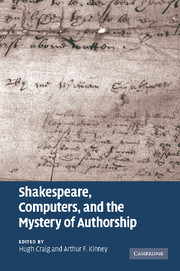Book contents
- Frontmatter
- Contents
- List of figures
- List of tables
- Notes on contributors
- Preface and acknowledgments
- 1 Introduction
- 2 Methods
- 3 The three parts of Henry VI
- 4 Authoring Arden of Faversham
- 5 Edmond Ironside and the question of Shakespearean authorship
- 6 The authorship of The Raigne of Edward the Third
- 7 The authorship of the Hand-D Addition to The Book of Sir Thomas More
- 8 The 1602 Additions to The Spanish Tragedy
- 9 Transforming King Lear
- Conclusion
- Appendix A Plays in the corpus
- Appendix B A list of 200 function words
- Glossary
- Index
- References
6 - The authorship of The Raigne of Edward the Third
Published online by Cambridge University Press: 06 January 2010
- Frontmatter
- Contents
- List of figures
- List of tables
- Notes on contributors
- Preface and acknowledgments
- 1 Introduction
- 2 Methods
- 3 The three parts of Henry VI
- 4 Authoring Arden of Faversham
- 5 Edmond Ironside and the question of Shakespearean authorship
- 6 The authorship of The Raigne of Edward the Third
- 7 The authorship of the Hand-D Addition to The Book of Sir Thomas More
- 8 The 1602 Additions to The Spanish Tragedy
- 9 Transforming King Lear
- Conclusion
- Appendix A Plays in the corpus
- Appendix B A list of 200 function words
- Glossary
- Index
- References
Summary
The Raigne of Edward the Third, printed by Thomas Scarlet for Cuthbert Burby, first appeared in the Stationers' Register on 1 December 1595. The title-page offered the following: ‘As it had bin sundrie times plaied about the Citie of London’. In 1599, Burby entered a second quarto in the Register. With the exception of variant spellings, the attribution remained the same.
Since then scholars have debated the authorship of Edward III with arguments drawn necessarily from internal evidence. The two entries in the Register are the only evidence of performance on record, and no manuscripts of the play exist. A consensus of scholars – some insistent, some more begrudging – now grants Edward III a measure of Shakespearean participation; it is included in the New Cambridge Shakespeare and the second edition of the Oxford Shakespeare. For Richard Proudfoot, a general editor of Arden 3, the play is the last of Tucker Brooke's Apocrypha to be substantively argued as the work of Shakespeare's, with a right to canonization at least equal to the early collaborative histories included in the First Folio.
In the past, scholars have argued both for and against sole Shakespearean authorship, and both for and against collaboration. Given the ostensibly rigid split in the structure of the play, arguments have been proposed for a double-authorship, with one author responsible for the first half of the play, and another for the second half. In this case, astute literary intuition may be said to have achieved objective accuracy.
- Type
- Chapter
- Information
- Shakespeare, Computers, and the Mystery of Authorship , pp. 116 - 133Publisher: Cambridge University PressPrint publication year: 2009
References
- 3
- Cited by



